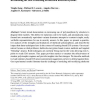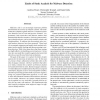205 search results - page 13 / 41 » A research demonstration of code bubbles |
ML
2010
ACM
13 years 7 months ago
2010
ACM
Current trends demonstrate an increasing use of polymorphism by attackers to disguise their exploits. The ability for malicious code to be easily, and automatically, transformed in...
SCAM
2007
IEEE
14 years 3 months ago
2007
IEEE
Clones are code segments that have been created by copying-and-pasting from other code segments. Clones occur often in large software systems. It is reported that 5 to 50% of the ...
ACSAC
2007
IEEE
14 years 3 months ago
2007
IEEE
Malicious code is an increasingly important problem that threatens the security of computer systems. The traditional line of defense against malware is composed of malware detecto...
GECCO
2005
Springer
14 years 2 months ago
2005
Springer
Because of the large number of possible combinations for the fuel assembly loading in the core, the design of the loading pattern (LP) is a complex optimization problem. It requir...
GAMEON
2000
13 years 10 months ago
2000
"Game AI" is the high-level control code for computer entertainment applications. Games are diverse, and the nature of game AI reflects this diversity. However, game AI,...


